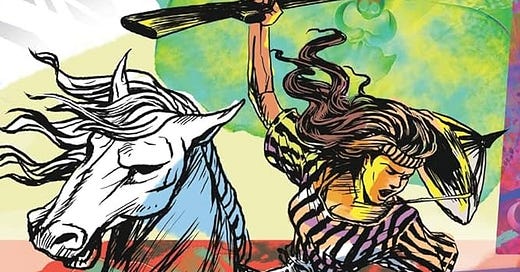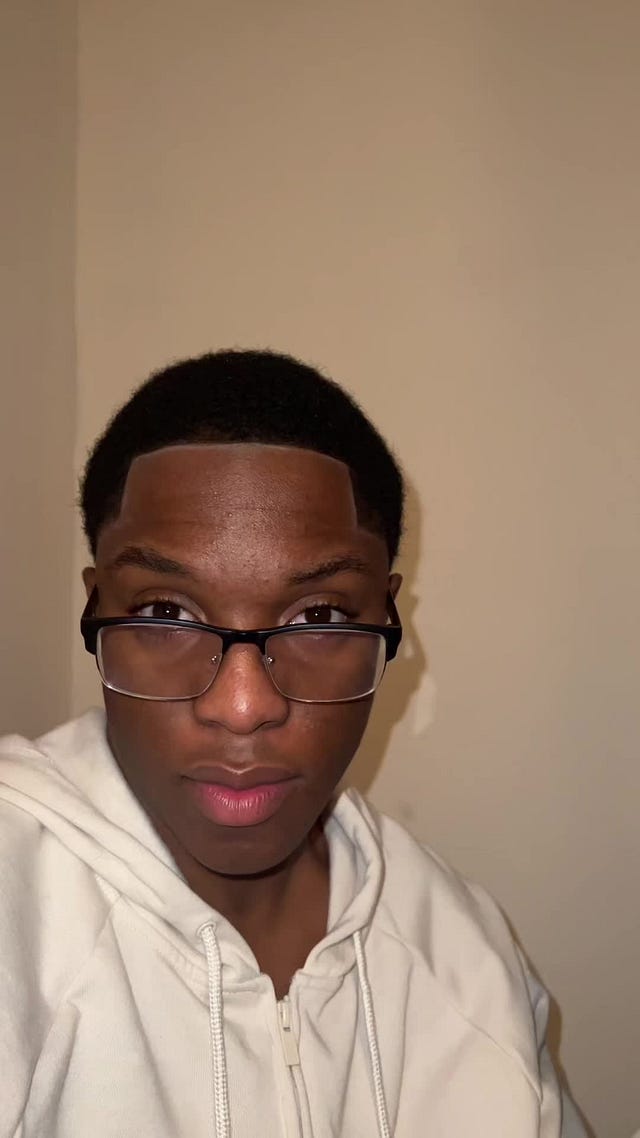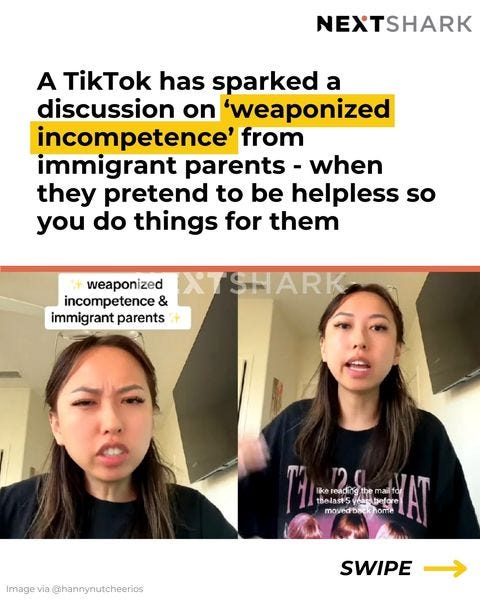Transgressing Well-Behaved Institutional Literary Standards
Essays 3-6 of Wanna Peek Into My Notebook?: Notes on Pinay Liminality (2022) by Barbara Jane Reyes
Just seeing the title and cover art of this prose collection by Barbara Jane Reyes cemented the need to get my hands on a copy. This is one of those books you get a strong feeling about— and I’m not referring to reading the publisher’s blurb and thinking you’ll find the plot enthusing, but this mounting hope that the text will be a long-awaited balm— and then, to your delight, reading the book validates that delicate pre-conception. What magic.
In winter 2022/spring 2023, I was looking for a book like this for my thesis on Pinay-written Anglophone poetry. Wanna Peek Into My Notebook?: Notes on Pinay Liminality (2022) populated as a search result, and it had only been recently published. Thank God I could request text purchases through my university’s library. While I was able to borrow it for a majority of a semester, I didn’t get to read the text in its entirety until September 2023, after I had already graduated. I ended up buying the book myself because as I said, I got the sense this book would be one I needed in my own personal collection. There’s a literary review of one of Reyes’s poetry collection that discusses her “poetics of f*ck.” Just. How very is that. [A Heathers (1988) reference for those that have seen the OG film.]
“There will always be a 19 year old Pinay who comes through my classroom, a young Pinay who finds our books and feels a little less invisible, who feels emboldened to commit her words to the page, who feels emboldened to tell her own stories.” (Reyes 157)
I was 19 years old (a college sophomore) when I was first exposed to books authored by Filipinos. [Isn’t that so… strange? To have never seen yourself in a story for that long.] My professor, who happened to be Filipino, included in his syllabus Jose Dalisay Jr.’s Killing Time in a Warm Place (1992), Ninotchka Rosca’s State of War (1988), Gina Apostol’s Gun Dealers’ Daughter (2012) [my personal favorite out of the works I read in this course], and of course, Jessica Hagedorn’s Dogeaters (1990).
Essay 3: To Decenter English
“A quick internet search will tell you that Filipinos have been ruled in English since 1898, and instructed in English since 1901. Question though, whether Filipinos are fluent in English— what constitutes fluency, what qualifies as fluency, especially in a (post)(neo)colonially stratified society— or whether Filipinos known enough English in order to mimic, but more so to be ruled and instructed, to execute basic commands. Question also: Which English? Whose English?” (Reyes 21)
My senior thesis advisor, in providing feedback for one of my chapter drafts (which discussed the creative resistance of reading works by Filipina authors in English and continuing to write in English), encouraged me to reflect on why I had chosen an English major as opposed to an Asian Studies major. It was then I realized that I had unconsciously followed the course of my life in my writing, and… it helped me wrestle with my hybridized identity, how it shows up unconsciously in my reading and writing practices. Getting to write through this has helped me feel like more of a person who lives with contradictions and less like some mutant phenomenon that critical theorists poke and prod.
Although I am Bisaya, I lost my ability to converse in Bisaya and Tagalog a long time ago. When I hear either of my homeland dialects spoken, I can’t distinguish the two from one another, although I understand what is being said. When my relatives speak to me in either Bisaya or Tagalog, I respond back in English. I only recently found out there’s a term for this: heritage language learner. I only came across this term because I, being an aspiring academic, was looking at the aforementioned professor’s CV, and he had indicated his language proficiencies. He wrote “Heritage Speaker/Intermediate Reading” by Tagalog/Filipino. Naturally, I looked up heritage speaker.
It’s a pretty known fact that the Philippines is an Asian country with one of the highest English proficiencies because of American colonization. There was a recent “scandal” where a popular Korean mukbang YouTuber got flack for promoting a racist caricature of a Filipino woman (who was actually not Filipino, as the punchline of the video was that it was an ignorant cosplay by a Korean comedienne); I’m not laughing. I learned about it because Filipina TikToker Aisha Rae (@arbacn) posted about it, and so did Stephanie Soo. I remember seeing a comment somewhere that pointed out how some Koreans go to the Philippines to learn English, and yet it is common (ironically so) for Koreans to make fun of Filipinos. I don’t write this to pit Filipinos against Koreans, but to point out how the root of these cultural tensions is out of frame, the root being the U.S. colonial power. This omission sows violence between and among the oppressed, so as to distract from those who have been pulling the strings for centuries.
 Tiktok failed to load.
Tiktok failed to load.Enable 3rd party cookies or use another browser
 Tiktok failed to load.
Tiktok failed to load.Enable 3rd party cookies or use another browser
If I am a stranger to my homeland, foreign to the native dialect(s), it’s not because I turned my back to my people on my own accord. Future me, remember that as you make your way back home.
Essay 4: What’s This Thing About Orientals Together On A Bus?
“The world in which we live, work, and write is messy, and it is full of injustice and violence; it needs us to bring our ruckus. We are at our best when we are scrappy; when we are noisy and unruly, unashamed of profanity, irreverence, and taboo.
Some of the most interesting works of ‘Asian American Literature’ thrive in the world of indie publishing and micro presses, where you will find our authors experimenting, prolific, testifying, refusing to conform to any single ‘Asian American’ canonical representation or well-behaved institutional standards. They have flipped their well-appointed writing desks and throw chairs. They write protest poems, performance texts, redactions and erasures, disaster capitalism poetics, polyglot, hip-hop, graphic narrative, comix, spec fic, YA lit, 21st century remythologizing, they genre and gender cross, bastardize, lyricize, holler, diatribe, pray, protest, decenter, transgress, decolonize, wail in lament, invent language, code switch like a motherfucker. As Tina Bartolome has written, they ‘mess with hegemony.’ ” (Reyes 35)
This excerpt is where this post’s title took inspiration from. I think a lot about how much melancholy and angst would render my writing “juvenile” and how much restraint I need to exercise in order for my writing to be considered “artful” instead of “indulgent.” Having been trained in close reading and literary study, you learn there’s a way to go about these things effectively, and yet I also wonder how much I’m distilling my spirit. It’s a fine dance. And I don’t dance.
In my (unfinished, lol) thesis, the first close readings I did were of erotic poems “finger exercise,” “swivel,” and “one for my baby, and one more for the road” by Filipina poet Conchitina Cruz in her poetry collection elsewhere held and lingered (2008). [It was important to me to talk about /seggz/ as someone who grew up steeped in purity culture and now has a public health background. I’d never given myself permission to openly ask questions like this before.] These weren’t necessarily ~cough, cinematic~ poems, but the sensuality, grief, and confusion were so poignant in their concurrent subtlety and clarity. Like an impressionist painting. Blurred but discernible (for some reason, I have a distinct memory of learning about Degas), focused and yet uncontained in its scope.
But sometimes I want to be a bulldozer.
Filipino/x studies scholar Neferti Tadiar [one time she visited my alma mater to give a guest lecture, and apparently she hung out with my professor and some of my organizer friends after the talk— where was I? I was in traffic, commuting back to the suburbia -_-] described writing as an act of becoming. I have come to appreciate more the inexactitudes of the writing process, the attempt to peel back layers of persona, falling short, and nevertheless trying to give shape to something. I guess this committing to paper is why it tends to be easier for me to declare I write rather than claim I am a writer. What is it to be a writer? I doubt, therefore I am…
—
“We’re really a small group of folks who work full time, mostly as educators, who meet regularly and plan shit, usually sitting around a table of lumpia and plates of pancit.” (Reyes 38)
I highlighted this sentence because it’s a plain picture of community organizing. It doesn’t romanticize or glorify the labor of love that is carving out spaces for people like us to be and continue to be. This lines conjures a memory of doing a book club with a few other organizers; being seated on the floor, on a sofa, on folding chairs; plates of har gow, dumplings, miso soup, egg drop soup, rice, seaweed, and so many condiments spread out on a coffee table and two folding tray tables.
Essay 5: What Does It Mean to be an APIA Author in “These Times”
“We must meaningfully resist appropriate by institutions that would skew and defang our words and work, via tokenism and celebrations of diversity, for example, for their own edifications. How we look when we are well dressed. How we look when we are acting ‘right,’ and ‘proper,’ when things go our way, which I think of as a reaction against the centuries of ‘negative’ portrayals of us. But then we have to think about whose value systems determine ‘negative,’ ‘positive,’ ‘beautiful.’ ” (Reyes 42-3)
I’m fixating on Reyes’s word choice of “defang.” Reyes sprinkles snake imagery throughout the book, which I just love so much. I think during one moment in another essay, Reyes parallels (mis)translating with the tongue forking. It reminds me of Grendel’s mother in Beowulf (which I wrote about in undergrad), and how modern translations and spins on the Old English epic can portray her feminine rage.
Beyond the monstress motif, this chapter of Reyes’s has me thinking about the avenues through which I share my writing. Do I go to an indie press? A traditional publisher? Academic press? Which publishers are credible? Respected? Why does that matter? For whom does it matter? How important to me is having full ownership? How will I be edited? Will anyone even find merit in what I have to say and how I say it? In 2022, even as I was writing my thesis chapter on the subversive potential of global Anglophone works, the publishing world’s bent for commodifying the works of authors of color threatened to stifle the hope I had for engaging in the creative storytelling process (specifically in my non-native English language) as well as the publication process. And then in fall 2023, I came to learn of a local Filipina-run indie press. I also attended an art show highlighting Pino/a/xy and Asian/-American artists. Seeing this communal resistance laid out before me has made all the difference in my praxis. There are places where our art thrives, and it doesn’t involve molding ourselves to white supremacist casts.
Starting a Substack has also helped me write through those anxieties about making my earnest thoughts publicly accessible. There’s no one but me who reads my drafts, which I think is a useful writing exercise for playfulness and “wildness” (to borrow from Reyes’s wording), and also for critique (the words flow from my fingertips, and I am the only one who can answer for the ways I reveal and hide myself).
Essay 6: Wanna Peek Into My Notebook?
“I’ve been reading essays about this burden of representation that is thrust upon the work of POC writers… Who wants us to represent, what do they want us to represent, why do they want us to represent in the ways they want us to represent. Within our own communities, this preference for the positive, uplifting, beautiful portraits and narratives of us.” (Reyes 80)
I’m thinking back to a fall 2020 class discussion on the book Crazy Rich Asians (2013) by Kevin Kwan (gag, the class consensus was that this was a beach read /derogatory - disclaimer, I don’t normally use beach read with this tone because I love a good beach read, but this was an icky beach read, as in you would get alcohol poisoning if you took a shot every time the word “exotic” comes up), during which it was brought up why this cosmopolitan (I would recommend skimming the introductory paragraph of the hyperlinked Stanford philosophy encyclopedia entry because it’s how I am using the adjective “cosmopolitan” here) narrative of old-money Singaporean families and glamour and love-conquers-all (even stubbornly classist Asian mothers [what a narrow, and I think lazy, form of critique; yeah, I said it]) happened to be, first of all, greenlit as the first big movie with an Asian/-American cast since Joy Luck Club (1993) and then become the high-grossing rom-com in the 2010s.
In remembering the reception of the Crazy Rich Asians movie, I’m reminded of how the Barbie (2023) movie’s feminism fell flat for me and in relation to this, some arguments made by proponents of liberal politics, on how centrist (think more “peaceful”, less “aggressive”) stances supposedly appeal to the public because it’s not so “offputtingly” disruptive (which, gah, I’m going to have to get into that another time). According to that line of reasoning, the Barbie (2023) movie’s lukewarm feminism was necessary to be more “accessible” in its educational undercurrent. Is liberalism a necessary step before more radical thinking? If I were to buy into that reasoning, I feel like I would have to uncritically celebrate the Crazy Rich Asians (2018) movie as paving the way for Hollywood to finally be inclusive of Asian/-American actors, and that’s something I’m suspicious of. [Although, the release of Everything Everywhere All at Once (2022) gave me hope that the kind of stories that are broadcasted wouldn’t be so bottlenecked and “de-fanged,” as Reyes writes in Essay 5.] This is not to say that the Crazy Rich Asians (2018) and Barbie (2023) movies can’t resonate with individuals, but it is to say I don’t think it should be an exemplar of what ~representation~ (a fraught word) can look like and accomplish for our communities.
In summer 2020 during the Black Lives Matter protests, I saw an Instagram post recommending books that center Black joy, not just stories of trauma and education (although they have their rightful time and place). The latter (trauma) should not be all that is allowed for Black authors to write about (although it has certainly seeped, biologically and behaviorally, into Black folks’ lives in no easily delineated way), and it should not be all that we find worthy of caring and thinking about.
—
“I thought [my parents] were so rigid, so old school, for thinking I was a failure, for thinking my ass should go back to college. I wanted to yell at them; I was following my dream! What the fuck did they know about dreams and romance!
[…] What did my parents know about dreaming and romance? Didn’t they leave everything behind, when they were in their early 20s. Didn’t they get on an airplane, to come and live in a foreign country, on another continent. Didn’t they know there were no guarantees.” (Reyes 93-4)
Immigrant parents. Those raised by immigrant parents know there’s a lot of anger and resentment to deconstruct there. What has been the most healing thing for me personally was re-humanizing my parents as kids who got older— not grew up, but got older— which I write purposefully to consider the resources I have (that inform my decisions, my handling of emotions, my writing) that they did not have and do not necessarily want to use today. They did the best they could with what they had, and I had to make the conscious decision that no hurt that they have ever inflicted upon me will negate this compassionate understanding. They’re not perfect, but they’re trying, and I’m lucky to have parents who try to express that in good faith. [It’s not the same for everyone, and it’s not helpful or kind to tell people with immigrant parent to just get over themselves. I know how messy it can get, which I try to meaningfully address in offline spaces.]
There was this TikTok video I saw maybe six-ish months ago about the “weaponized incompetence” of immigrant parents. Hearing what the OP had to say just gave me a sinking feeling in my stomach, which told me that I found something in that video to be counter-productive, although I couldn’t quite put my finger on why exactly.
I shared this with my close friends on Instagram because I trust them to help me draw out what was so grating to me about her usage of that term. Some fellow organizers responded to my story post, saying that turning our backs on our communities won’t save us and that “shit talking” immigrant parents reinforces shame and embarrassment from the less-than-ideal experiences that influenced their outlooks and behaviors (which is not to excuse dysfunctional parenting techniques).
I wrote back to one friend, “I feel like weaponized incompetence, esp since it was first termed to describe MEN who do the least, just doesn’t sit well w me, who has the worldview of someone whose immigrant parents literally did the MOST.” In her next response, this friend articulated what I could only gesture at:,“No that’s such a good point abt how weaponized incompetence is a term used to describe a group of ppl that were historically favored by society, and then using it to describe groups of ppl that by and large aren’t holding that much social currency.”
And there it was. That feeling you get when you remember the word that you’d forgotten for days. This friend zeroed in on what was uneven about the OP’s usage of the phrase “weaponized incompetence”— between men and immigrant parents, only one has institutional access to power. This friend’s thoughts then gave form to my own thinking on how the OP’s usage of the phrase “weaponized incompetence” displaces the term’s original context from men(!) relegating reproductive, domestic labor to women onto immigrant parents’(!) dysfunctional interpersonal relationships with their children.
Appropriating terms from their specific contexts (almost like plagiarizing) is irresponsible, and I worry that “weaponized incompetence” can be used as (racist) fodder for folks to denigrate our community members (immigrant parents). Now, is this to say we should not talk candidly about our struggles? No. But I am saying that co-opting the term to punch down (immigrant parents) instead of punch up (men) is not an effective strategy for talking through these very real challenges of (dis)connecting with our immigrant parents all the while hegemonic powers are surveilling us. I am also saying that it is imperative we think intersectionally, in which we reach an understanding of how oppression (misogyny, anti-Blackness, colorism, fatphobia, ableism, [etc.] and apologia for all of the above) is facilitated within and among our communities without throwing the collective under the bus.
Responding to the OP’s points by calling her some version of ungrateful (i.e., telling her she simply doesn’t realize how much work our parents have done for us and that her take is un-nuanced) is also irresponsible. Problematizing this terming moves the focus away from personal (subjective) perceptions of behavior (for which there should always be space to feel and talk through) and instead to systems of power like (neo)colonialism and patriarchy that disempower our communities.
Let’s come up with a shared vocabulary that allows us to truthfully and equitably(!) name our experiences. It’s part of the creative requirements of world-making.
I’m ending this post with Ruby Ibarra’s freestyle rap to P-pop boy group SB19’s song “CRIMZONE.” I think of Ibarra’s lyrics as an example of Reyes’s “forking their tongues” and the block quote from Essay 4— bringing our ruckus (24).









